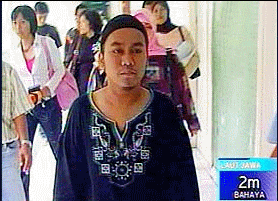
Arif goes home
# 363
Good news about human cases of the H5N1 infection has been hard to come by in recent months. In Indonesia, 6 of the 7 positively identified bird flu patients since the beginning of the year have died. In Egypt, 4 out of the last 4 identified have succumbed.
The lone success story we know about, in the last month or so, has been Arif Saad, the 18-year-old son of Riyah who died from the virus two weeks ago. Today, he was pronounced cured of the virus, and was allowed to go home.
This from Liputan 6 TV News.
27/01/2007 14:43
Wise, the positive patient bird flu, today, goes out of the Friendship Hospital, East Jakarta. The Tangerang resident, Banten, this was stated recovered or the bird flu negative after undergoing the intensive maintenance.
Liputan6.com, Jakarta: Several positive patients bird flu recovered because of being not slow in getting the maintenance of the health.
It was wise, the positive patient bird flu from Tangerang, Banten, on Saturday (27/1), left the Friendship Hospital, Jakarta East.
He was stated recovered the total alias of the bird flu negative after menjalami the maintenance and the inspection [read: the Health of four patients the Assumption of Bird Flu of improving].
Not just Wise the positive patient bird flu that recovered from the virus attack avian influenza.
The hospital of Raden Mataher Jambi was treating four assumption patients of bird flu while being waiting for results of the last inspection of the Body of the Health of the Department's Research And Development in Jakarta.
The patient who came from one family was reconciled from RS Bratanata Jambi.
Beforehand, four patients were stated positive bird flu.
The patients were carried to the hospital not long after their kept chicken died suddenly.
Wise recovery proved that the bird flu illness was quite dangerous.
But, this illness could be cured and avoided by increasing the pattern of the clean and healthy life.
Arif was stricken with the illness after his mother was hospitalized, and already being treated for the H5N1 virus. That gave him a distinct advantage over many other patients; he received his treatment early in the course of his illness.
I’ve spent a good deal of time discussing the treatment of avian flu with several doctors, and they all agree. Early and aggressive treatment has the best chance for a positive result. Once the virus has gone through several replication cycles, and has flooded the body with millions of copies of itself, it become very difficult to beat back the infection.
If a pandemic occurs (still an `if’), and the virus retains its lethality, then getting the proper medicines into the hands of infected patients within the first 12 to 24 hours will be imperative. Unlike today, when there are only a handful of patients to be cared for by hospitals, most would have to be treated at home.
In the UK, a `Bird Flu Buddies’ plan has been proposed, where everyone would select someone to go fetch medicines for them, should they become infected. It’s a simple idea, but it makes a good deal of sense. The last thing we need are feverish, infected people queuing up somewhere in public, waiting to get a box of Tamiflu.
Health authorities are still pinning their hopes on a major reduction on the lethality of this virus. Very little has been said regarding the home care of victims, beyond the likelihood that it will be necessary. One hopes they are right.
But hope is not a plan. And here in the US, and around the world, we need to start seriously talking about how to care for pandemic flu victims in the home. And we need to start talking about it now. Not waiting until a pandemic has started.
The list of medicines that doctors have told me they would want to have on hand for the home treatment of an avian flu patient go far beyond 10 capsules of Tamiflu and a bottle of Nyquil. Much of what they tell me is educated guesswork, based on the limited information we’ve received to date on patient treatments and outcomes. But frankly, I agree.
It isn’t too late to discuss home medical options with your family physician. Some won’t be receptive to it at all. Others might just surprise you. You won’t know until you ask.
Dr. Grattan Woodson has an excellent home care guide for flu victims on the Internet. He has put together advice for a range of care options, depending on the resources you might have available. His website is a fountain of good information, as is his book.
A pandemic is estimated to have an attack rate of 30% or greater. That means that nearly every family will be touched, in one way or another, by the virus. Knowing what to expect, what you will need, and how to deal with it, can be life saving.
And it isn’t too early to start.